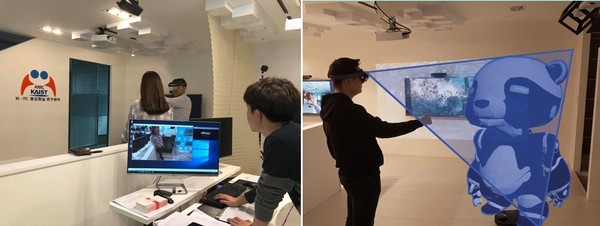The KAIST Augmented Reality Research Center (ARRC) runs the “Virtual Augmented Reality (VR/AR) Professional Manpower Training Project” supported by the Ministry of Trade, Industry and Energy and the Korea Institute for Advancement of Technology (KIAT).

The project is hosted by the Korea Electronics Association (KEA) with the goal of fostering new industries and training professional manpower in the field of key industries. KAIST (for AR software and platform), Sogang University (for VR application service), and Seoul University (for AR hardware) have formed a business unit for this project. The government will provide 6.65 billion KRW to foster education in the specialized fields of the universities. Adding the budget of participating institutions and companies the total amount for five years sums to 8.4 billion KRW.
The field of VR/AR is attracting attention as the core user interface of the Fourth Industrial Revolution. Particularly, technologies such as digital twins that copy information from reality to the virtual environment for analysis, software that predicts the future based on accumulated data and provides a virtual experience, and complementary technology that utilizes AR technology have been in the spotlight as potential catalysts of the Fourth Industrial Revolution.
Accordingly, KAIST has established the “KAIST CT-AR Program” at the Graduate School of Culture Technology (GSCT) with the purpose of nurturing talents focused on practical skills. Starting in 2020 Fall, this program will continue for five years. Each year, about 10 MS and PhD students will be selected as leaders of core technologies such as digital twins, environmental recognition/tracking, realism enhancement, intelligent information enhancement, and 3D interaction.
Selected students are provided with scholarships, joint research opportunities with domestic and foreign companies, and the chance to participate in international academic societies. Such opportunities will act as stepping stones for growth as AR R&D experts equipped with experience and leadership skills. The classes of this program are designed to strengthen practical capabilities in response to the needs of various industrial sites. These sites for first-hand experience will be provided by industry-university cooperation businesses.
In connection with this project, Daejeon City is also establishing an open industry-academic cooperation platform in KAIST by providing funds for the next five years in order to foster local talents. The new space will be used as an open laboratory where students and participating companies can attempt various collaborative research in the field of VR/AR.
Professor Woontack Woo of the GSCT stated his plans to prepare for the digital twin-based VR·AR era through cooperation with businesses.

